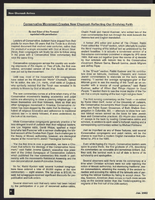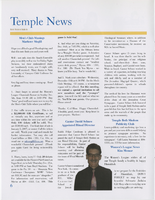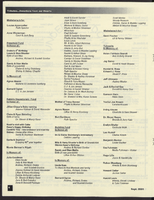Search the Special Collections and Archives Portal
Search Results
Piero's Italian Cuisine (Las Vegas, Nev.)
Piero's Italian Cuisine is a Jewish-owned restaurant in Las Vegas, Nevada. It was established in 1982 by Freddie Glusman on Karen Avenue.
Corporate Body
Fagel, Harry
From the transcript: "In the signature line of Harry Fagel’s emails is a reads: Be the light in dark spaces. This illumines the person that Harry is both as a police officer and a poet in Las Vegas. Harry is native Las Vegan, who has served the community with the Las Vegas Metropolitan Police Department for nearly 30 years. He currently is a police lieutenant serving in Laughlin, Nevada. In addition, Fagel is a respected poet, writing both for the public and on commission. He performs in the local poetry scene.
Person

Transcript of interview with Lt. Harry Fagel by Barbara Tabach, April 15, 2016 and January 13, 2017
Date
Archival Collection
Description
In the signature line of Harry Fagel?s emails is a reads: Be the light in dark spaces. This illumines the person that Harry is both as a police officer and a poet in Las Vegas. Harry is native Las Vegan, who has served the community with the Las Vegas Metropolitan Police Department for nearly 30 years. He currently is a police lieutenant serving in Laughlin, Nevada. In addition, Fagel is a respected poet, writing both for the public and on commission. He performs in the local poetry scene. He also has showcased his poetry in two published books, released an album, and is a recipient of the Hilliard Endowment Grant from the University Nevada, Reno. Fagel is a graduate of the University of Nevada, Las Vegas, and currently lives in Henderson with his wife, Leilani and two sons, Sam and Jake. In this interview, Fagel discusses his family background, how his grandparents came to live in Las Vegas in the 1950s, as well as his relationships with both his mother and father. He recalls his early jobs which included working for his cousin Freddie Glusman?s restaurant Piero?s and for Circus Circus-long before becoming a policeman. His involvement with the Jewish community started young and he shares how it has evolved over the decades. In addition, Fagel reflects upon his career as a law enforcement officer, the progressiveness of the Las Vegas Metropolitan Police Department, and changes in relations between the police and communities, both locally and nationally. Lastly, Fagel talks in detail about his poetry, its dominant themes, and the local poetry scene.
Text

Photographs of Piero's Italian Cuisine sign, Las Vegas (Nev.), April 4, 2017
Date
Archival Collection
Description
Site address: 355 Convention Center Dr
Sign owner: Freddie Glusman
Sign details: Opened 1982, and was originally located on Karen Avenue. In 1987 the restaurant was moved to its current location on Convention Center Drive. This location claims to have an old time Vegas Rat Pack vibe. It has become a popular spot for Politicians and Mobsters
Sign condition: 5- Still in very good condition, looks nearly new
Sign form: Pylon and sign on building
Sign-specific description: On the building and the pylon sign the word "Piero's" is in white channeled neon letters in a fancy swirled font. The Pylon sign has a red background, and underneath the main logo states, " Italian Cuisine- Fresh Fish- Piano Bar" in red skeletal neon. On the building there is a red steel sign that states "Italian cuisine- Osso Bucco- Steaks- chops -Fresh Fish - Florida Stone Crab" all in white skeletal neon.
Sign - type of display: Neon
Sign - media: Steel
Sign environment: On Paradise Road and Convention Center drive next to a Las Vegas Marriott.
Sign - thematic influences: This sign showcases the use of both skeletal neon and channeled letters which gives an interesting contrast to their sign.
Sign - artistic significance: The script they use for their main logo sets the tone for the restaurant as being fancy and fine dining.
Survey - research locations: Piero's website http://pieroscuisine.com/ and photos of the property.
Surveyor: Wyatt Currie-Diamond
Survey - date completed: 2017-08-20
Sign keywords: Pylon; Neon; Steel; Building-front design; Backlit
Mixed Content

Transcript of interview with Jacque Dvorak by Barbara Tabach, March 09, 2017
Date
Archival Collection
Description
Jacque Dvorak was born in London, England, in 1944. Two years later, her family immigrated to Canada and then in 1953 they fulfilled their dreams to reside in the United States. The Dvorak family settled in Long Beach, California where Jacque?s brother was born. In 1957, the Dvorak family relocated to Las Vegas when Jacque?s father, Sam, opened a 24-hour barbeque restaurant in Market Town with his brother Harry. While growing up in California, Jacque enjoyed dancing and being on stage. She found herself drawn to performance much like her mother, Irene, who was an entertainer in Great Britain. This enthusiasm served her well in her future retail career which included the opening of the MGM. Jacque attended Las Vegas High School and graduated in 1962. Taking full advantage of being a teenager in Las Vegas, Jacque remembers the days when the need to lock your doors didn't? exist. Though, Jacque describes being keenly aware of being Jewish and forming strong bonds within the Jewish community through BBYO and other Jewish organizations. She also recalls protesting during school prayer recitations in the 1960s. In this interview Jacque gives an insider?s perspective of growing up in Las Vegas and Jewish life in the city. Her stories range from tales of teenage fun to dealing with modern anti-Semitism in Las Vegas to the joy she has found in friendships in the community. Jacque has two children, Harry Fagel and Lisa Sokoloski.
Text

Transcript of interview with Bob Arum by Barbara Tabach, October 20, 2016
Date
Archival Collection
Description
Bob Arum is the founder and CEO of Top Rank boxing promotions company in Las Vegas, Nevada. Born in New York, Arum is a former attorney and a member of the International Boxing Hall of Fame. He promoted his first fight for Muhammad Ali in 1966 and moved Top Rank’s headquarters to Las Vegas in 1986. He has produced countless fights in the city and helped to make it “The Fight Capital of the World.” In this interview, Arum talks about the path that led him to a career in boxing promotion, from childhood in Brooklyn, New York, to education at New York University and Harvard Law School, and finally meeting Muhammad Ali while working at New York law firm. He discusses his work with Ali, as well as other boxers, including Marvin Hagler, Sugar Ray Leonard, Tommy Hearns, Roberto Durán, George Foreman, and Oscar De La Hoya, and the growth and evolution of the sport over the past forty years. In addition, Arum talks about the role of Judaism in his life, his involvement with the local Jewish community, and the importance of the Chabad movement.
Text




